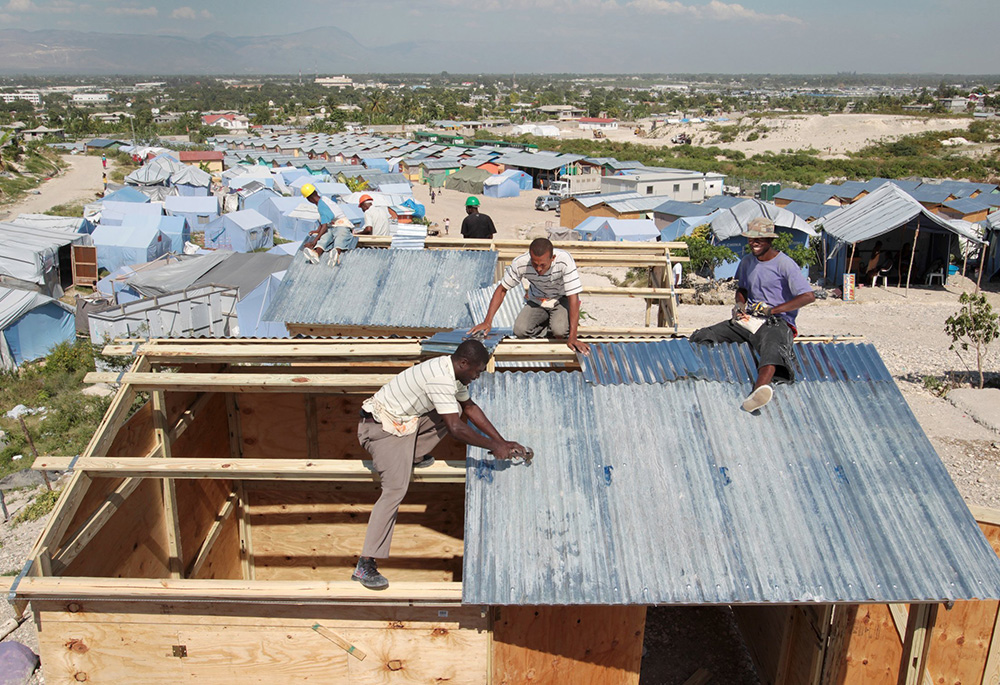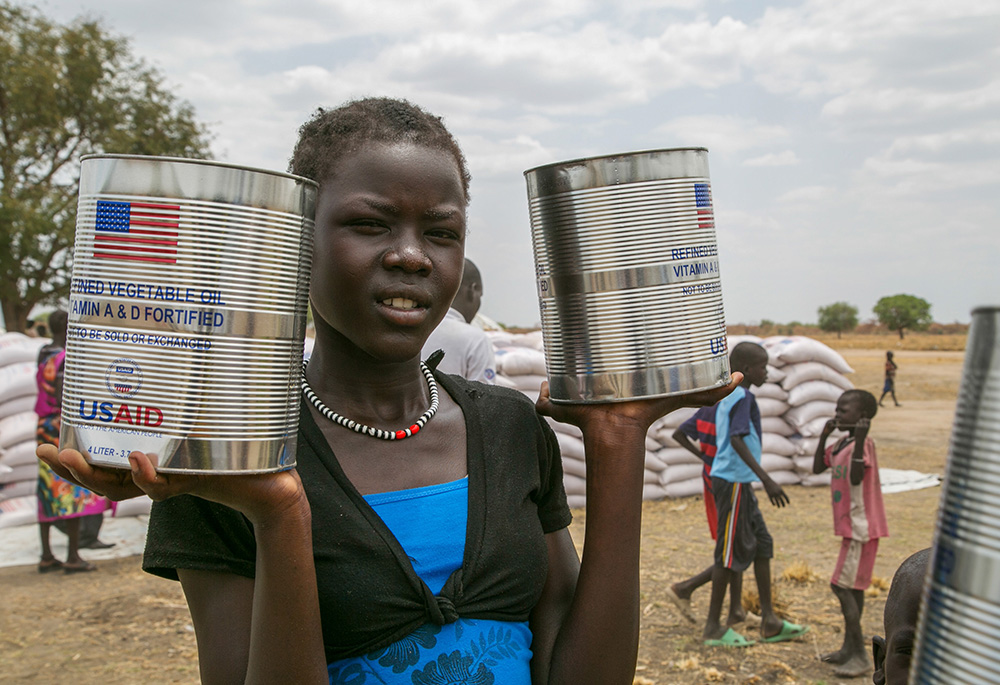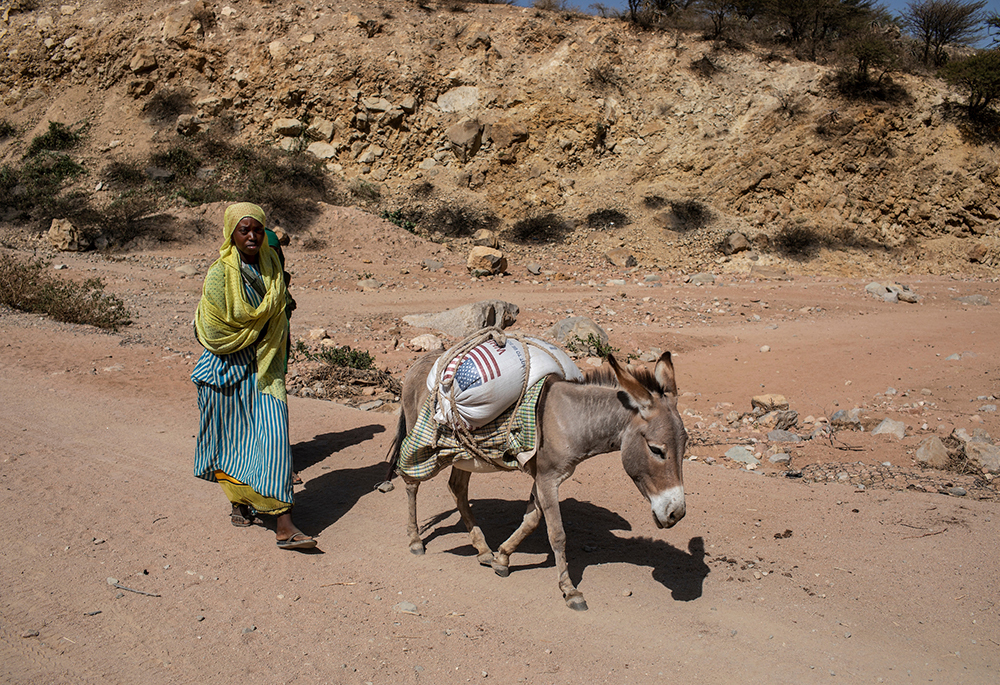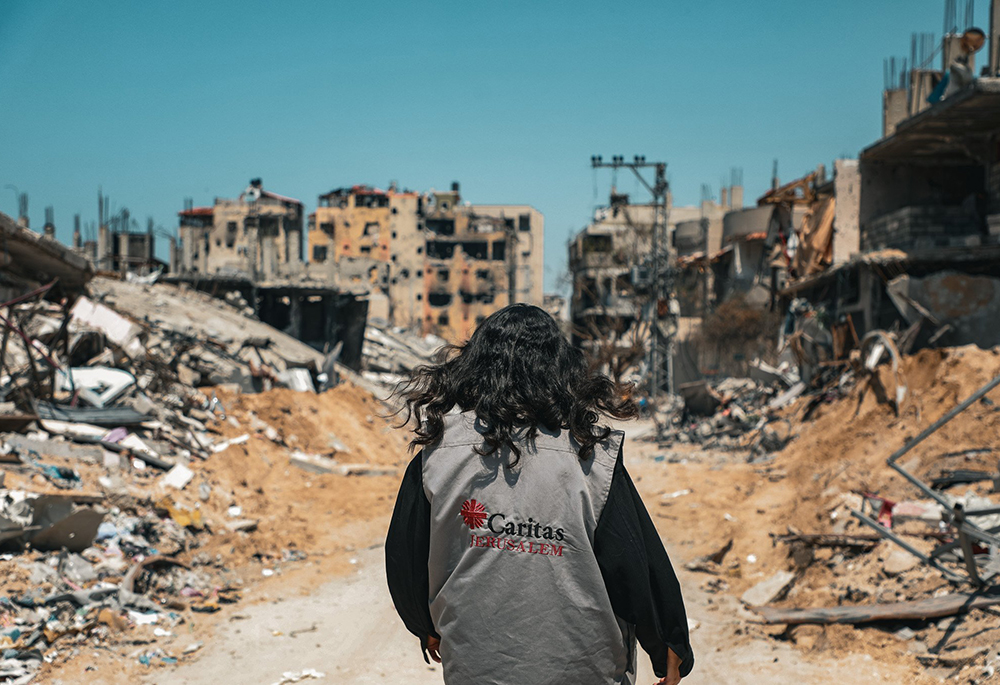
Workers at a camp in Terrain Toto, Haiti, construct transitional shelters provided by Catholic Relief Services for those left homeless in the 2010 earthquake. Catholic Relief Services was among the humanitarian entities deeply affected by USAID cuts. (OSV News/Bob Roller)
I can't read the minds of President Donald Trump or Elon Musk. So I can only speculate on what is really happening with the dismantling of the U.S. Agency for International Development, or USAID — an action decried by Catholic sisters and congregational representatives engaged in humanitarian ministries and in advocacy at the United Nations.
One representative told me last week (the week of Feb. 10), "What is happening in our nation's capital is a travesty." Meanwhile, the Adrian Dominican Sisters released a statement Feb. 10 saying the moves against USAID had "frightening life-or-death implications for people in dire need around the world, especially women and children."
The Michigan-based congregation concluded by saying the evisceration of USAID "has enormous implications for the common good of God's people and planet." (On Feb. 13, a federal judge ordered the Trump administration to temporarily lift a funding freeze that had effectively shut down USAID's work, the Associated Press reported. What happens in the long term remains uncertain.)
So, why is Trump calling for the agency to be shut down?
Both the president and Musk claim that USAID, now under the eye of the U.S. State Department, is a bastion of fraud and corruption. The White House said the week of Feb. 3 that USAID "has been unaccountable to taxpayers as it funnels massive sums of money to the ridiculous — and, in many cases, malicious — pet projects of entrenched bureaucrats, with next-to-no oversight."
Meanwhile, Musk has tarred USAID with the charge that it is an evil, criminal organization and "a viper's nest of radical-left [M]arxists who hate America."

A woman holds cans of vegetable oil provided by U.S. Agency for International Development in Pajut, South Sudan, on March 17, 2017. (CNS/Catholic Relief Services/Nancy McNally)
The suggestion of conspiratorial left-wing machinations aside, it is worth noting that both Republican and Democratic administrations (and Republican majorities in Congress) have supported USAID since its creation in 1961.
So, what is it with the dismantling? Is it outright cruelty? Ill-conceived policy that is not well thought out? Are Trump and Musk trying to make a very cynical and public example of an agency that receives less than 1% of the federal budget?
It could be all of these things. But at the heart of it, I think, is something almost, but not quite, visible on the surface, centering on an age-old clash inherent in American history, the tension between the market and morality.
And what a tension it is — a clash many of us feel in our bones, that was laid out for me years ago during a graduate school lecture by the late historian James M. Washington, a beloved professor of African American church history at Union Theological Seminary.
Professor Washington said the tension between morality and market is at the heart of the American experience: We Americans love the market and what it produces. But we also aspire to be a moral people, and when the market and morality clash, we are often at a loss to decide which should dominate. (The market, of course, tends to win out — a reality that is keenly felt by those living "the underside" of the American experience.)

A woman uses a donkey to transport wheat supplied by USAID as drought relief near Ejianeni, Ethiopia, on Feb. 12, 2019. (CNS/Courtesy of CRS/Will Baxter)
Such tension is plain to see: Proponents of the market are often leery of anything that smacks of morality (read: "regulation"), thinking the market and its "natural laws" are their own kind of morality.
We see this guiding ideology in a president who believes that, in both the private and public realms, everything is transactional — all of life, and now government programs, should be codified by market rules.
But U.S. international assistance, of course, does not fit neatly into the market paradigm. U.S. dollars spent on foreign aid programs — whether providing food, emergency assistance, HIV treatment and other medical care — do not, it is true, yield "profit." But they do earn the United States goodwill, and most importantly, they save lives.
They do that in part because, as anyone with experience in economically poor countries knows, the market cannot, and certainly does not, take care of every need, everywhere.
One sister at the United Nations with wide experience in ministries in southeast Africa told me last week that free-market policies in countries where there are already great inequalities are in fact exacerbating those inequalities.
Such policies pose a challenge to what she called "real ethical and moral values" — the kind that undergird Catholic social teaching. And in economically poor countries, USAID helps alleviate, or at least soften, those inequalities.
Ironically, some of the most pointed criticisms of USAID through the years have come not from the ideological right, but those in progressive corners. They argue that USAID programs, particularly development initiatives in the 1970s and 1980s, too often promoted the status quo and helped local elites and not those at the grassroots.
Advertisement
Don't forget: USAID was created by the Kennedy administration at the height of the Cold War as a bulwark against what the United States saw as global communist threats. In many parts of the world, such as Latin America, that meant U.S. assistance — both humanitarian and development aid — helped prop up unpopular and repressive regimes in the name of fighting communist influence.
That critique can be expanded to the U.S. "aid industry" in general — private as well as government assistance. Too often, critics say, USAID programs tend to favor the work of U.S.-based humanitarian groups over local agencies — like those working in Haiti, for example. And when it comes to food aid, it is often said, programs tend to favor the products of U.S. farmers over local producers.
A fine analysis of this dynamic with a particular focus on Haiti was just published by the Center for Economic and Policy Research. In it, analyst Jake Johnston writes: "There are many parts of the U.S. foreign aid industry that can and should be stopped or significantly reformed."
But, he said, that does not mean "shutting down USAID, or making its assistance even more overtly political by placing it under the umbrella of the State Department, is going to be a good thing, either in the short or long term."
Johnston concludes: "The reality is that, where foreign assistance is least effective, it is largely because it is designed to promote U.S. interests rather than address the needs of those ostensibly on the receiving end. The changes announced by the Trump administration are not likely to truly disrupt U.S. soft power abroad. If anything, it will make political interventionism an even more explicit aim of US foreign assistance."
In other words, a dynamic where the "transactional" becomes even more explicit should be avoided.

A Caritas worker walks through destroyed buildings in Gaza City on March 16, 2024. (OSV News/Courtesy of Caritas Poland)
Let me add a personal note here. Before I joined Global Sisters Report a decade ago, I was an "in-house" journalist for the ecumenical humanitarian agency Church World Service. (In that capacity I also freelanced frequently for National Catholic Reporter.) Through travels to dozens of countries as a humanitarian journalist, I witnessed Church World Service's work and the work of similar groups, such as Catholic Relief Services, Caritas, Doctors without Borders, a number of European church-based agencies, as well as USAID.
Were the programs perfect? No, of course not. But most were good, and most did good — especially when they adhered to the principles of supporting grassroots local leadership, management and participation.
Did I see corruption and ideological fervor at play? Also, no. What I did see were dedicated humanitarians in often very difficult situations committed to alleviating suffering and hardship, particularly in emergency situations.
In the case of faith-based groups, I witnessed people trying to apply Gospel principles of mercy and solidarity in their work with communities facing real challenges. And they did that, more often than not, with few resources.
That is the type of vision and commitment that a hurting world — particularly in places like Haiti, the Gaza Strip and Ukraine — needs right now. Yes, the U.S. aid industry needs reform. But the world would be much poorer, literally and figuratively, without the work of USAID and other bodies.
Let's hope that those seeking needed reform of U.S. foreign assistance will do so without further imperious decisions by fiat; slander and ugly name-calling; and the gutting of programs that, however imperfect, are at the end of the day saving lives and affirming the common good.







